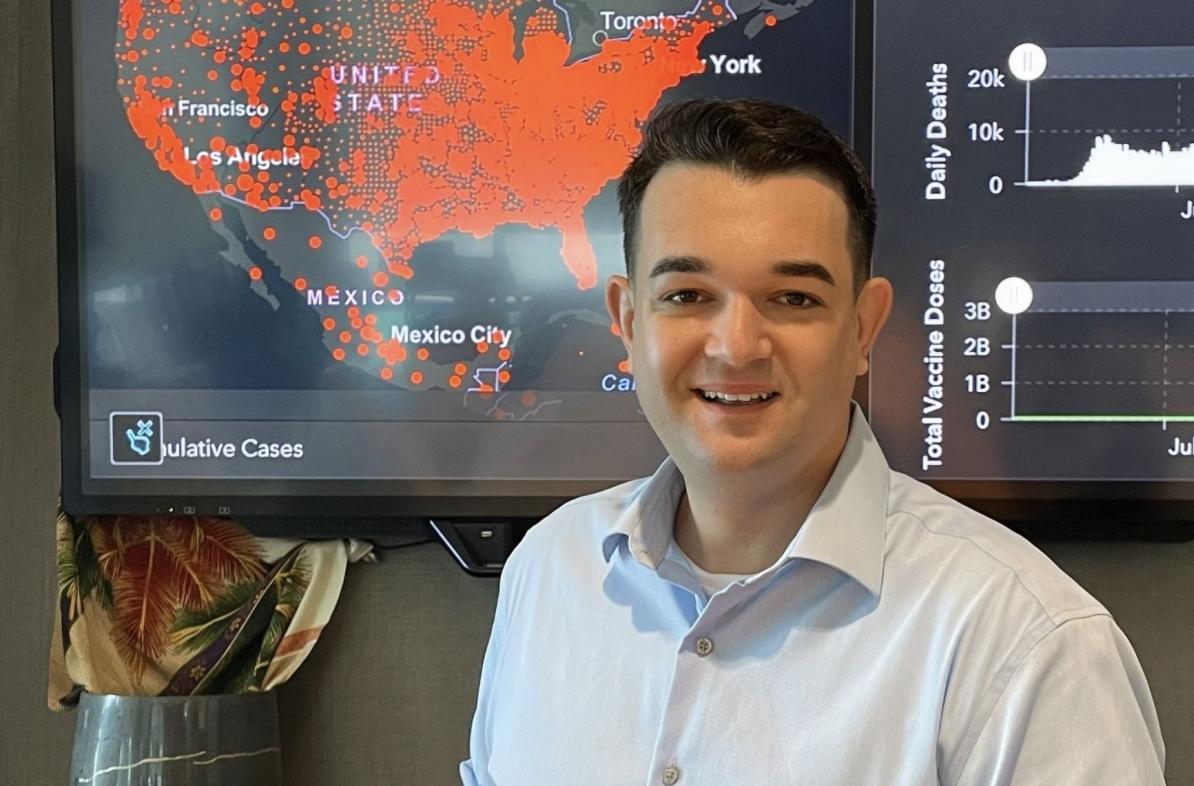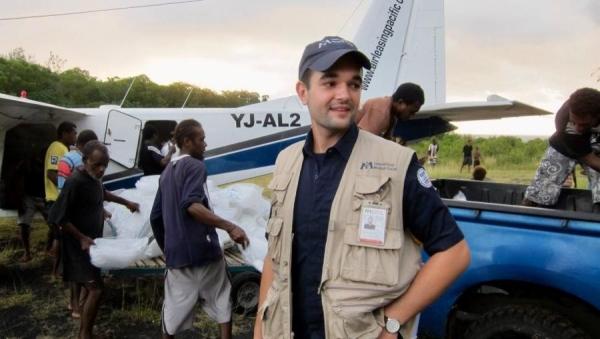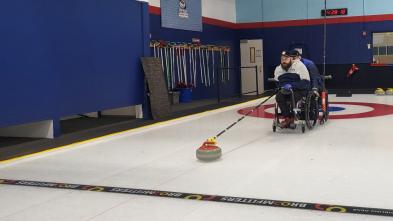
Global public health career: Alumni update with Jacob Schafer
In conversations or stories about enriching out-of-classroom opportunities at the University of Wisconsin-Eau Claire, it quickly becomes clear that so much more than a student’s choice of major impacts their career and life trajectory.
For 2009 Blugold graduate and epidemiologist Jacob Schafer, it was those hands-on practical student experiences outside of his major that shaped his path to public health.
“I graduated with a bachelor’s in biology and a minor in global studies, but it was the opportunities I found through the environmental public health (ENPH) department that truly set me apart for career success,” Schafer says.
Schafer cites collaborative student-faculty research opportunities and an ENPH internship with the Eau Claire HIV/AIDS resource center as experiences that sparked his career interest in global public health and prepared him well for graduate school.
Schafer completed a master’s degree in epidemiology in 2010 and has had a 15-year career in public health, featuring leadership roles such as:
- Pandemic awareness program manager for the U.S. Agency for International Development (USAID).
- Global health security advisor for the International Medical Corps.
- Director of infection control and employee health for the Waianae Coast Comprehensive Health Center.

As Schafer admits, a career in public health certainly could have been a successful outcome with a similar major/minor combination from a different university. However, he says it was the exact blend of opportunities he got as a Blugold that made the difference for him.
“The unique blend of disciplines at UWEC — biology, global studies and public health — was the academic foundation I needed for a career in global public health and outbreak response,” Schafer says.
“Were it not for UWEC’s environmental public health program combined with the access to microbiology labs, instrumentation and faculty expertise, I may well have become a scientist who knows a lot about diseases in the world but lacks the practical knowledge or ability to actually do something about them,” Schafer says.
As this spring marked the 50th anniversary of the ENPH program at UW-Eau Claire, it seemed like an opportune moment to catch up with a highly successful product of Blugold ENPH program experiences.
“Jacob Schafer's initiative drove him to cross disciplinary boundaries at UWEC, earn a master's degree in epidemiology and distinguish himself as a valued public health professional,” says Dr. Crispin Pierce, professor of public health and environmental studies.
Schafer recently took time to answer our questions about his career and his time as a Blugold. Find his responses in his own words below.
What is your current role in public health and how do you feel your education at UW-Eau Claire best prepared you for your career?
I am currently the director of infection control and employee health for the Waianae Comprehensive Health Center on the Hawaiian island of Oahu. My professional journey in public health has taken me across five continents responding to disease outbreaks, leading humanitarian teams into disaster zones and working alongside a variety of people, from world leaders to warlords.
I’ve also had the privilege of becoming a science communicator, a public health advocate and now an adjunct university instructor.
Thinking back to my graduate school experiences at Queen Margaret University in Scotland, I quickly realized how far ahead UWEC had placed me. I had significantly more real-world experience under my belt than many of my peers who had come from top institutions in Europe, Africa and Latin America. I was even invited to advise the Scottish Parliament in developing their national NARCAN program, directly because of the experience I gained through my UWEC internship.
What began as hands-on experience in Eau Claire launched me into high-level, real-world work advising foreign governments by the age of 24.
What career accomplishments are you most proud of at this point in the journey?
One of the challenges of public health crises is that if your work is successful, it often means something bad doesn’t happen — or that something bad happens less badly. Measuring your accomplishments can be difficult when the greatest victories are invisible.
However, I’ve been fortunate to receive some notable public recognition for my work, though I share credit with my teams over the years. I was listed as a “40 Under 40” honoree by Pacific Business News in 2021; and I’ve been recognized by the state of Hawai’i for my local contributions to public health. I once was presented, quite memorably, with an honorary Burmese sword by the Archbishop of Myanmar.
The accolades and trophies are wonderful, and I’m sincerely grateful for them. But among my true accomplishments and greatest honors, teaching stands out as the most personally meaningful.
Teaching is most meaningful to me because science — especially public health — only fulfills its promise when people trust and understand it. The scientific method is intuitive to those of us who use it every day, but most of society does not live in that world. That disconnect has real consequences — vaccine controversies are one notable current example.
Who is one person you met at UW-Eau Claire who you stay in touch with. Tell us about their impact on you.
Aaron Brewster: “The man, the myth, the institution of UWEC student life.”
When I first met Aaron, he was a seventh-year senior. He knew everyone and everyone knew him. He pulled me into student organizations, introduced me to activism and somehow talked me into founding both the Progressive Student Association and the ACLU-UWEC Chapter. He also served as the unofficial ambassador for international students and ran a couch-surfing empire out of his house, where a good portion of the student body probably crashed at some point.
More than anything, Aaron showed me that the most valuable part of college isn’t the academics or getting a degree. It’s learning how to build a mutually enriching community, even if it’s stitched together with mismatched furniture, big ideas and a rotating cast of characters with each bringing something uniquely valuable to the table.
Brewster had a similar impact on my sister when she attended UWEC — a full decade later.
Outside of your classes, what student experiences did you have as a Blugold that most contributed to your overall career readiness or your general personal growth?
Looking back, what I’m most grateful for at UWEC was the chance to be life-curious and the freedom to experiment academically, socially and personally. Eau Claire offered a wide menu of opportunities and I dove in. I took a geology class and loved it. I took a pottery class and quickly learned I had no future in ceramics. I got involved in political activism through student organizations, which sparked a lifelong passion.
UW-Eau Claire gave me more than an education; it gave me a compass. I immersed myself in student orgs, research, community service, study abroad and even a clandestine Arbor Day tree planting in the dead of night after our official request was denied. That tree still stands — a quiet reminder of the resilience and audacity UWEC helped instill in me.
What do you wish you had known as a student at 20 years old?
I wish I had sought out career advice tailored to me. Pop culture and motivational posters urged me to “follow your passion,” while more practical voices told me to focus on getting a job that will pay the bills. I’ve learned that my greatest successes come from the place where passion, mission, vocation and profession align — the overlapping sweet spot in the Venn diagram of what you love, what the world needs, what you’re good at and what someone will pay you to do.
Another lesson I wish I’d learned earlier is the importance of building a professional network. Tapping into the wisdom, connections and hard-won insights of others isn’t cheating — it’s smart. Seek out mentors. Ask for guidance. Don’t rely on luck alone. Investing in those relationships and maintaining them has paid off far more than any other asset I have. Like any smart investment, the key is to get in early. And when it’s your turn, pay it forward.
What is a favorite element of your student life that you cannot imagine having gone without?
UWEC is renowned for its study abroad program, with good reason. I spent a semester in Costa Rica and it was one of the most formative experiences of my life. I wish all students could take advantage of study abroad; it can be the most valuable experience of an entire degree program. We live in an increasingly global world and the lessons learned from immersing ourselves in another culture — lessons about the world and about ourselves — are invaluable for college-aged students. It shaped my perspective in ways no classroom ever could.
What advice would you give to current and future Blugolds interested in a career in public health?
First, get as broad a range of experience as you can, as early as you can. I’ve worked in government, military, nonprofits, academia, healthcare and private sectors. In today’s fast-changing world, adaptability is survival. Don’t pigeonhole yourself with one label. Until COVID, I didn’t even call myself an epidemiologist. Titles change, but missions stay the same. Seek out opportunities as a young professional that build your range and flexibility, in case you need it later. Some of my peers (many of them far smarter than I) didn’t do this, and now, unfortunately, they’re freshly unemployed with limited options.
Second, never sacrifice your ethics. When the job pressure gets real in political, financial or personal ways, and it will, you’ll be tempted to cut corners. Don’t — integrity is a career superpower. It’s the one thing no one can take from you and it’s why I sleep soundly every night, no matter how difficult the work gets. Skills and experience build your profession, but integrity and reputation are what define your career.
You may also like


